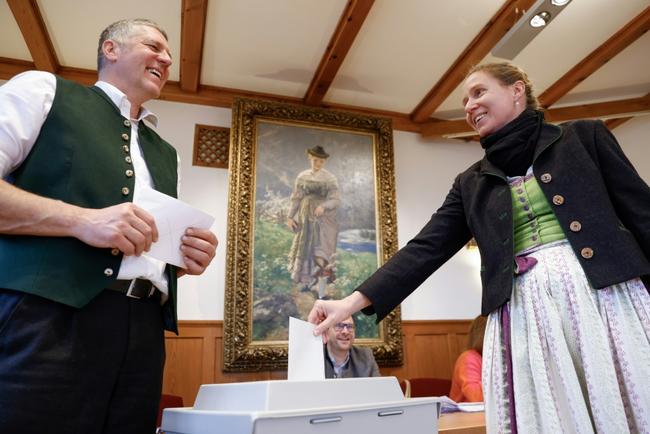Germans vote under shadow of far-right surge
Germans vote under shadow of far-right surge

Breaking News
Don't miss out on the headlines from Breaking News. Followed categories will be added to My News.
Germans went to the polls Sunday in a pivotal election, with the conservatives the strong favourites after a campaign rocked by a far-right surge and the dramatic return of US President Donald Trump.
Frontrunner Friedrich Merz has vowed a tough rightward shift if elected to win back voters from the anti-immigration Alternative for Germany (AfD), which is eyeing a record result after a string of deadly attacks blamed on asylum seekers.
If he takes over from embattled Chancellor Olaf Scholz of the centre-left SPD, as widely predicted given a yawning poll gap, Merz has promised a "strong voice" in Europe at a time of chaotic disruption.
Casting his ballot in Berlin, Daniel Hofmann, a 62-year-old urban planner, said it was his "civic duty" to vote as "right now we are going through very uncertain times".
"There must be a change, a transformation," he said, declining to say whom he had voted for.
More than 59 million Germans are eligible to vote and first estimates based on exit polls are expected soon after polls close at 6:00 pm (1700 GMT).
Election officials said that by 2:00 pm (1300 GMT) around 52 percent of eligible voters had cast ballots in polling stations -- compared to just 36.5 percent by the same time in the 2021 election. However more people voted by post at the last polls due to the pandemic.
The high-stakes vote in the EU's biggest economy comes amid tectonic upheaval in US-Europe ties sparked by Trump's direct outreach to Russian President Vladimir Putin over their heads to end the Ukraine war.
Across Europe, NATO allies worry about the future of the alliance, nowhere more than in Germany which grew prosperous under the US-led security umbrella.
Merz, in his final CDU/CSU campaign event in Munich on Saturday, said Europe needed to walk tall to be able to "sit at the main table" of the world powers.
Voicing strong confidence, he told supporters in a large beer hall that "we will win the elections and then the nightmare of this government will be over".
- 'High stakes' -
In a strange twist to the polarised campaign, the AfD has basked in the support lavished on it by Team Trump with billionaire Elon Musk touting it as the only party to "save Germany".
The AfD, strongest in the ex-communist east, is on track for its best-ever result after Germany was shocked by a series of high-profile attacks in which the suspects were asylum seekers.
In December a car-ramming through a Christmas market crowd killed six people and wounded hundreds, with a Saudi man arrested at the scene.
More deadly attacks followed, both blamed on Afghan asylum seekers: a stabbing spree targeting kindergarten children and another car-ramming attack in Munich.
On Friday, a Syrian man who police said wanted to "kill Jews" was arrested after a Spanish tourist was stabbed in the neck at Berlin's Holocaust memorial.
"I am afraid that the AfD will become strong," said Frankfurt voter Janine Wirmer, 32, a project manager, who was carrying a young child in her arms at the voting booth.
For her the key issues "continue to be climate protection and of course Ukraine, especially now with regard to Trump and how the USA is suddenly behaving".
- 'Last chance' -
Amid the rise of the AfD, Merz has argued the next government must boldly address their concerns, warning that otherwise the far right might win next time around.
"The stakes could not be higher", argued political analyst and author Michael Broening, who serves on the SPD's Basic Values commission.
"Germany's mainstream parties have consistently failed to convince voters to reject the far right, and this election could be their last chance to turn the tide."
Democratic forces must find solutions to economic stagnation, immigration challenges and voter disaffection, he said, adding that "if Germany’s 'establishment' parties fail to deliver this time, they may not be the establishment for much longer".
For the next German leader, more threats loom from the United States, long its bedrock ally, if Trump sparks a trade war that could hammer Germany's recession-hit economy.
Trump, asked about the elections in Germany, which he has berated over its trade, migration and defence policies, said dismissively that "I wish them luck, we got our own problems".
Scholz will stay in charge as caretaker until any new multi-party government takes shape -- a task which Merz has confidently said he hopes to achieve in two months, by Easter.
fz-sr-sea/gv
Originally published as Germans vote under shadow of far-right surge


